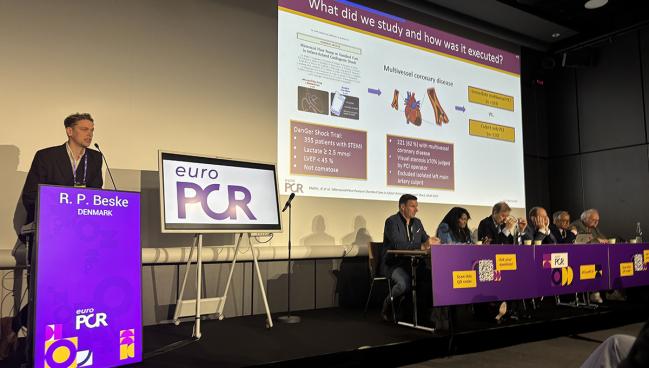Immediate Multivessel PCI May Not Be So Bad in STEMI Patients With Shock: DanGer Data
Current guidelines support culprit-only PCI in these cases, but the “hypothesis-generating” results suggest taking a closer look.

PARIS, France—Immediate multivessel PCI offers similar survival out to 180 days when compared with culprit-only PCI among STEMI patients with cardiogenic shock, according to provocative new data from the DanGer Shock trial.
The DanGer Shock results stand in contrast with those of the randomized CULPRIT-SHOCK trial, which demonstrated that revascularization of the culprit vessel only was associated with lower risk of death than immediate multivessel PCI in more than 700 patients with STEMI/NSTEMI and multivessel disease presenting in cardiogenic shock.
CULPRIT-SHOCK led to both the US and European guidelines recommending against multivessel PCI in this population. Recently, however, a Korean registry study suggested that immediate versus culprit-only PCI can lower the risk of all-cause death and repeat revascularization in such patients.
Rasmus Paulin Beske, MD, PhD (Risghospitalet, Copenhagen, Denmark), who presented the DanGer Shock findings here today at EuroPCR 2025, said it might be time for another randomized trial to truly know the best strategy in STEMI patients with multivessel disease complicated by cardiogenic shock.
“The results are suggesting that if we take a very selected cohort of patients with cardiogenic shock STEMI, as the cohort in the DanGer Shock trial, the results might differ [from CULPRIT-SHOCK]. But, again, this is observational data,” Beske said.
Despite the adjustments the researchers made in their observational analysis, there might be “hidden confounding,” said Beske. He also noted some key differences between the trial cohorts.
Importantly, just over two-thirds of CULPRIT-SHOCK patients had a STEMI, while DanGer Shock was comprised entirely of STEMI patients. About half of those enrolled in CULPRIT-SHOCK, but none in DanGer Shock, had been resuscitated following cardiac arrest, “so maybe the modifiable cause of death was not really there,” he continued. Also, roughly one-third of participants in the earlier trial had a lactate level less than 2 mmol/L where the shock might have not been “profound enough” for the treatment to take effect.
To TCTMD, Holger Thiele, MD (Heart Center Leipzig-University Hospital, Germany), the lead investigator of CULPRIT-SHOCK, stressed that the new DanGer Shock data can only clarify so much. “This is a non-predefined, post hoc analysis of a randomized trial and they . . . found neutral results,” he said, adding that the number of patients included was also substantially smaller.
“It’s hypothesis-generating,” Thiele said, adding that “maybe in the group of patients with STEMI and cardiogenic shock, immediate multivessel PCI may be similar [but] I would not say superior.” In the STEMI subgroup of CULPRIT-SHOCK, he noted, there was no significant signal that these patients benefited.
Outside the setting of cardiogenic shock, complete revascularization is strongly recommended in both the US and European guidelines for acute coronary syndromes.
Similar Survival at 180 Days?
The long-awaited DanGer Shock trial, published in 2024, was considered a big win for the routine use of mechanical circulatory support (MCS) with the Impella CP (Johnson & Johnson) microaxial flow pump in patients with STEMI and cardiogenic shock. It showed lower mortality at 180 days compared with standard care.
The new analysis, which was focused on the best revascularization strategy, included 221 patients from DanGer Shock: 103 had immediate multivessel PCI and 118 had culprit-only PCI. There were no differences between the groups in how many patients received Impella (52% vs 47%).
Mean patient age in the two groups was 68 and 69 years, respectively, while 82% and 75% were male. Mean LVEF was 25%, and mean lactate was 4.6 mmol/L for both groups. While baseline Syntax scores were similar between the study arms (29 and 28), those who received immediate PCI had a bigger postprocedure improvement than the culprit-only group (22 vs 17; P < 0.001).
When the researchers looked at all-cause mortality at 180 days, they found similar risks between immediate-multivessel and culprit-only PCI in both an unadjusted analysis (OR 0.65; 95% CI 0.38-1.11) and when they adjusted for demographic variables (OR 0.66; 95% CI 0.37-1.20). However, they did find a significant benefit for immediate-vessel PCI when they adjusted for coronary anatomy (OR 0.51; 0.27-0.95) and various clinical factors (OR 0.40; 95% CI 0.19-0.83).
There were no differences between the groups in terms of safety events like need for renal replacement therapy (36% vs 27%; adjusted HR 1.20; 0.76-1.91) and BARC 3-5 bleeding (18% vs 22%; adjusted OR 0.75; 95% CI 0.38-1.49).
Studies like this are important because while the guidelines changed following the publication of CULPRIT-SHOCK in 2017, Beske explained, clinical practice has not shifted all that much. In fact, data suggest that 40-50% of patients with shock are still receiving immediate multivessel PCI.
“This is a little bit disturbing to see this,” Thiele said during the session. With CULPRIT-SHOCK, culprit-only PCI “had a number needed to treat of 12 to save one life,” he pointed out. “But if you believe that [immediate multivessel PCI is] beneficial—although it has clearly been shown in a randomized trial that you increase the mortality—I think this is difficult.”
Beske said he, too, was surprised to see such frequent use of the immediate strategy and that it’s clear “we do not follow guidelines.”
Thiele told TCTMD it’s unlikely that the field will see another randomized trial in this space, though it might be worth looking more into why physicians aren’t going along with clinical recommendations. Additionally, he said, much more research is needed to delve into broader indications for Impella and the optimal use of Swan-Ganz pulmonary artery catheters, as well as device-related complications like bleeding and limb ischemia.
Yael L. Maxwell is Senior Medical Journalist for TCTMD and Section Editor of TCTMD's Fellows Forum. She served as the inaugural…
Read Full BioSources
Beske RP. PCI in multivessel disease and STEMI-related cardiogenic shock: A DanGer Shock substudy. Presented at: EuroPCR 2025. May 20, 2025.
Disclosures
- Beske reports no relevant conflicts of interest.





Comments